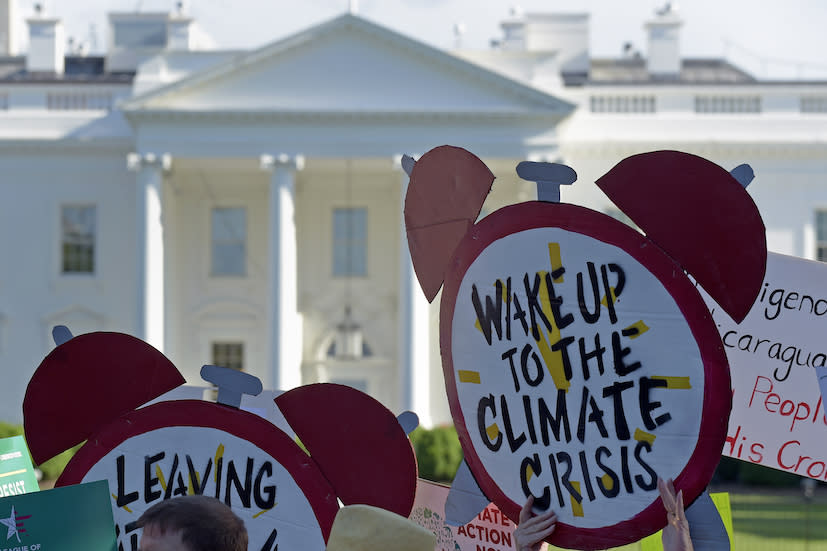Energy & Environment — US plummets in climate progress ranking

Researchers find the U.S. fell further behind other nations on climate progress during the Trump presidency; Vice President Harris premieres the Biden administration’s new national security plan for water; and reducing nitrogen oxides could improve crops.
This is Overnight Energy & Environment, your source for the latest news focused on energy, the environment and beyond. For The Hill, we’re Rachel Frazin and Zack Budryk. Someone forward you this newsletter? Subscribe here.
Rollbacks left US behind in climate fight: report
The U.S. plummeted in international rankings of action on climate change, due predominantly to rollbacks under the Trump administration, according to a report issued Wednesday from Yale and Columbia University researchers.
For the Environmental Performance Index (EPI), researchers traced countries’ progress toward net-zero emissions, a goal nearly every nation has established. From 2010 to 2019, the U.S. ranked 20th out of 22 western democracies and 43rd overall on its trajectory toward net-zero, according to the EPI.
How we got here: “This relatively low ranking reflects the rollback of environmental protections during the Trump Administration,” the report says. “In particular, its withdrawal from the Paris Climate Agreement and weakened methane emissions rules meant the United States lost precious time to mitigate climate change while many of its peers in the developed world enacted policies to significantly reduce their greenhouse gas emissions.”
How do other countries stack up? Britain and Denmark are the only countries on track to achieve net-zero by 2050, according to the report. Meanwhile, Namibia and Botswana would achieve the goal based on current progress but are not considered on track because projected growth in their economies is predicted to knock them off course, according to the EPI.
However, the report also found that countries high on the ranking have managed to “decouple” their emissions from economic expansion rather than having to make a choice between increased emissions or economic contraction.
Read more about the report here.
Harris unveils plan to elevate water security
Vice President Harris on Wednesday announced a plan that aims to elevate water security as a national security issue.
She said that the plan would involve “fully committing” the U.S. to helping provide access to safe water and sanitation services around the world by sharing “world-leading” water data to help manage and preserve water resources and using diplomatic resources to “elevate water security” as an international priority.
“This action plan will help our country prevent conflict and advance cooperation among nations, increase equity and economic growth and make our world more inclusive and resilient,” she said.
What’s involved? A copy of the plan said that it would also involve “identifying and supporting” investment funds to connect communities with resources to help them pay for water and sanitation and using government agencies to provide loans and political risk insurance to support private sector investment in water, sanitation and hygiene.
It will also involve developing new climate-friendly technology for water desalination and recovering water resources and working on initiatives with the Group of Seven, the Group of 20 and the United Nations.
Harris has been vocal about water and other infrastructure issues and has sought to promote the administration’s efforts on these issues.
In her speech, Harris noted that water insecurity can drive migration and also result in armed conflict amid disputes between countries or communities over water resources.
Read more about the plan here.
Minimizing pollutant may lead to better crop yields
Eliminating one common air pollutant from the atmosphere could lead to considerable gains in agricultural production, a new study has found.
Nitrogen oxides — gases found in car exhaust and industrial emissions — pose a significant threat to global crop yields, according to a report in Science Advances, published on Wednesday.
These findings, uncovered through satellite imagery, could have significant implications for boosting agricultural output and determining climate change mitigation costs, the authors wrote.
“Nitrogen oxides are invisible to humans, but new satellites have been able to map them with incredibly high precision,” study lead author David Lobell, of Stanford University’s Center on Food Security and the Environment, said in a statement.
“Since we can also measure crop production from space, this opened up the chance to rapidly improve our knowledge of how these gases affect agriculture in different regions,” Lobell added.
While scientists have long recognized the potential of nitrogen oxides to be damaging, little was understood about their actual effects on crop yields, the authors wrote.
Nitrogen oxides can both directly damage crop cells and indirectly impact them through their role as precursors to the generation of ozone, according to the study. Ozone is an airborne toxin known to hamper crop success.
Read more here from The Hill’s Sharon Udasin.
HAALAND TESTS POSITIVE FOR COVID
Interior Secretary Deb Haaland tested positive for COVID-19 on Wednesday, according to the Interior Department.
A department statement said she tested positive after experiencing “mild symptoms.” She last tested negative on Monday during a White House visit and was not in close contact with President Biden.
Haaland is fully vaccinated and was boosted twice. She is isolating and the department said she’s confident she will make a “swift recovery.”
The official canceled her planned travel to the West Coast and is working remotely.
WHAT WE’RE READING
Nevada’s conservation plan amidst drought (CBS News)
UN chief worries Ukraine war overshadowing climate fight (The Associated Press)
In reversal, EPA deems Pruitt’s phone booth ‘a violation’ (E&E News)
Miracle Fuel Hydrogen Can Actually Make Climate Change Worse (Bloomberg)
And on a lighter note: EPA raises LGBT+ flag for the first time, Happy Pride.
That’s it for today, thanks for reading. Check out The Hill’s Energy & Environment page for the latest news and coverage. We’ll see you tomorrow.
For the latest news, weather, sports, and streaming video, head to The Hill.

